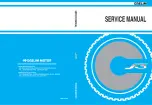
45
Operation
Accelerating
Accelerate by opening the throttle (rolling the throttle control grip rearward). The more
quickly you open the throttle, the more quickly the motorcycle accelerates. For even acceler-
ation, open the throttle with a smooth, continuous motion. When you reach the recom-
mended speed for upshifting, shift up one gear. See page 43.
WARNING! Accelerating abruptly could cause your body to shift rearward suddenly, which could result
in loss of control. Accelerating abruptly could also cause loss of control on low traction surfaces. Loss
of control could result in serious injury or death. Always accelerate gradually, especially on wet,
slippery or other low traction surfaces.
Braking
Always allow sufficient stopping distance so that brakes can be applied gradually.
Tip: Applying slightly more front brake than rear brake generally provides the best braking perfor-
mance.
1. To slow the motorcycle with the brakes, close the throttle and apply the front and rear
brakes evenly and gradually.
2. As the motorcycle slows, disengage the clutch, or downshift each time vehicle speed
reaches a downshift point.
WARNING! Braking improperly could result in loss of control, which could result in serious injury or
death. Avoid braking abruptly. Always apply the brakes gradually, especially on wet, slippery or other
low traction surfaces. Avoid braking in a curve or turn. Bring the motorcycle to the upright position
before applying the brakes.
Stopping the Engine
Before stopping the engine, bring the motorcycle to a complete stop. Shift to neutral or dis-
engage the clutch.
WARNING! Stopping the engine with the transmission in gear while the motorcycle is moving could
cause loss of rear wheel traction or engine and transmission damage, which could cause loss of control
and serious injury or death. Always stop the engine after the motorcycle is fully stopped and the
transmission is in neutral. If the engine stops unexpectedly while the motorcycle is moving, guide the
motorcycle to a safe location off the road and away from traffic.
1. When fully stopped, shift into neutral.
2. Move the engine stop/run switch to the STOP position.
3. Move the ignition switch to the OFF position. Remove the ignition key.
Tip: Idle air control (IAC) noise is a normal engine management calibration process that occurs each
time the engine stop/run switch is put into the STOP position or when the key is turned off.
















































